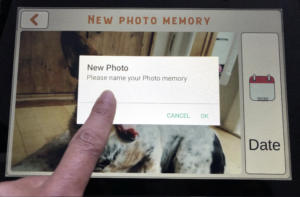
Memory Machine (MeMa) 3.0


A paper by Dominic Price, Rachel Jacobs, Elvira Perez Vallejos, Dimitri Darzentas, Neil Chadborn, Sarah Martindale, Hazel Robbins and myself was presented at Designing Interactive Systems 2019 in San Diego. The paper entitled MeMa: Designing the Memory Machine’ is now available in the proceedings of the conference and it documents: ‘the Memory Machine project which aims to develop a device to capture people’s memories to create a blend of personal and factual data that builds identities, and contextualizes personal recollections. The Memory Machine has been guided by co-production and user-centred design principles to ensure users’ input has a critical role in the development of the technology. Through a series of creative workshops, we facilitated participants to discuss and represent their perceptions of memory making and recollection, towards the design of the Memory Machine. This paper investigates how a creative, participatory process enabled technical topics to be explored together, as well as enabling the participants to address more challenging issues of memory; such as painful memories, memory loss, and memories at end-of-life, with a particular focus on dementia, to inform the future design of the Memory Machine.’ Also, there is a very nice poster with hand drawn sketches here, which gives an overview of the project.
Neil Chadborn travelled to Liverpool last week to present the Memory Machine project to the Technology and Ageing special interest group at the annual conference of the British Society of Gerontology. Take a look at Neil’s slides:
Researchers at Nottingham University would like to invite you to the fourth Memory Machine workshop, as part of a series of workshops that explore how new technologies can help us preserve memories that are important for us. You’re welcome regardless of whether or not you attended previous Memory Machine workshops.
Sarah Martindale – media researcher – will lead the interactive and creative workshop which will take place on Thursday 22nd of November, 12.00 – 4.00 pm at the Institute of Mental Health, Jubilee Campus.
Participants will receive a £10 high street shopping voucher as a thank you. Travel expenses to the venue will also be covered with lunch and refreshments provided.